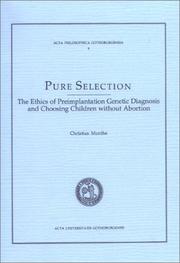| Listing 1 - 1 of 1 |
Sort by
|

ISBN: 9173463620 9789173463621 Year: 1999 Publisher: Göteborg Acta universitatis Gothoburgensis
Abstract | Keywords | Export | Availability | Bookmark
 Loading...
Loading...Choose an application
- Reference Manager
- EndNote
- RefWorks (Direct export to RefWorks)
Preimplantation genetic diagnosis (PGD) is taken to mark the starting-point of a new phase in human reproduction, where the possibility of choosing children on genetic grounds without having to resort to dangerous or ethically controversial procedures (such as abortion) will gradually increase. Ethical and political issues actualised by this development are addressed. The discussion touches upon issues regarding the moral status of embryos and gametes, the moral import of respecting individual autonomy and its implications for the requirement of informed consent in health-care, the connection between sickness, disability and the value of life, the moral status of possible future people, and the connection between choosing children and eugenic policies of the past. Practical policy issues are adressed on the basis of this as well as an empirical case-study of the introduction of PGD in Sweden. The book ends up in a set of recommendations regarding the management of research on, introduction and routine use of pure selection, both within health care and from the point of view of society as a whole. It is argued that research on such procedures should be allowed and supported by society. However, tight restrictions regarding the clinical introduction of new procedures in this area is highly desirable. A rough model for implementing such restrictions is also presented. It is further asserted that, although reasons of economy and safety should limit the access to pure selection, society should not apply any explicit restrictions based on ideas regarding how different traits affect a person's quality of life. It is stressed that, in order to avoid a resurrection of eugenic policies of the past, the development in this field underlines the need for continued and strengthened public support to the sick, disabled and mentally retarded.
#GBIB:CBMER --- pre-implantatie genetische diagnose (PGD) --- prenatale diagnostiek (prenatale test) --- in-vitrofertilisatie (bevruchting in vitro, proefbuisbaby's) --- embryostatuut (moreel statuut van het embryo, juridisch statuut van het embryo, potentiële persoon) --- ethiek (ethische aspecten) --- diagnostique génétique pré-implantatoire (DPI, diagnostic préimplantatoire) --- diagnostic prénatal (test prénatal, DPN) --- fécondation in vitro (fertilisation in vitro, FIV, fécondation in vitro et embryo transfert, FIVETE) --- statut de l'embryon (statut moral de l'embryon, statut juridique de l'embryon, personne potentielle) --- ethique (aspects ethiques) --- Preimplantation genetic diagnosis --- Human embryo --- Fertilization in vitro, Human --- Prenatal diagnosi --- Genetic counseling --- Fertilization in Vitro --- Preimplantation Diagnosis --- Bioethics --- Eugenics --- Genetic Counseling --- Diagnostics préimplantatoires --- Embryon humain --- Fécondation in vitro --- Diagnostics prénatals --- Conseil génétique --- Moral and ethical aspects --- Transplantation --- Aspect moral --- Preimplantation genetic diagnosis - Moral and ethical aspects --- Preimplantation genetic diagnosis - Sweden --- Human embryo - Transplantation - Moral and ethical aspects --- Fertilization in vitro, Human - Moral and ethical aspects --- Prenatal diagnosi - Moral and ethical aspects --- Diagnostics préimplantatoires - Aspect moral --- Diagnostics préimplantatoires - Suède --- Embryon humain - Transplantation - Aspect moral --- Fécondation in vitro - Aspect moral --- Diagnostics prénatals - Aspect moral
| Listing 1 - 1 of 1 |
Sort by
|

 Search
Search Feedback
Feedback About UniCat
About UniCat  Help
Help News
News